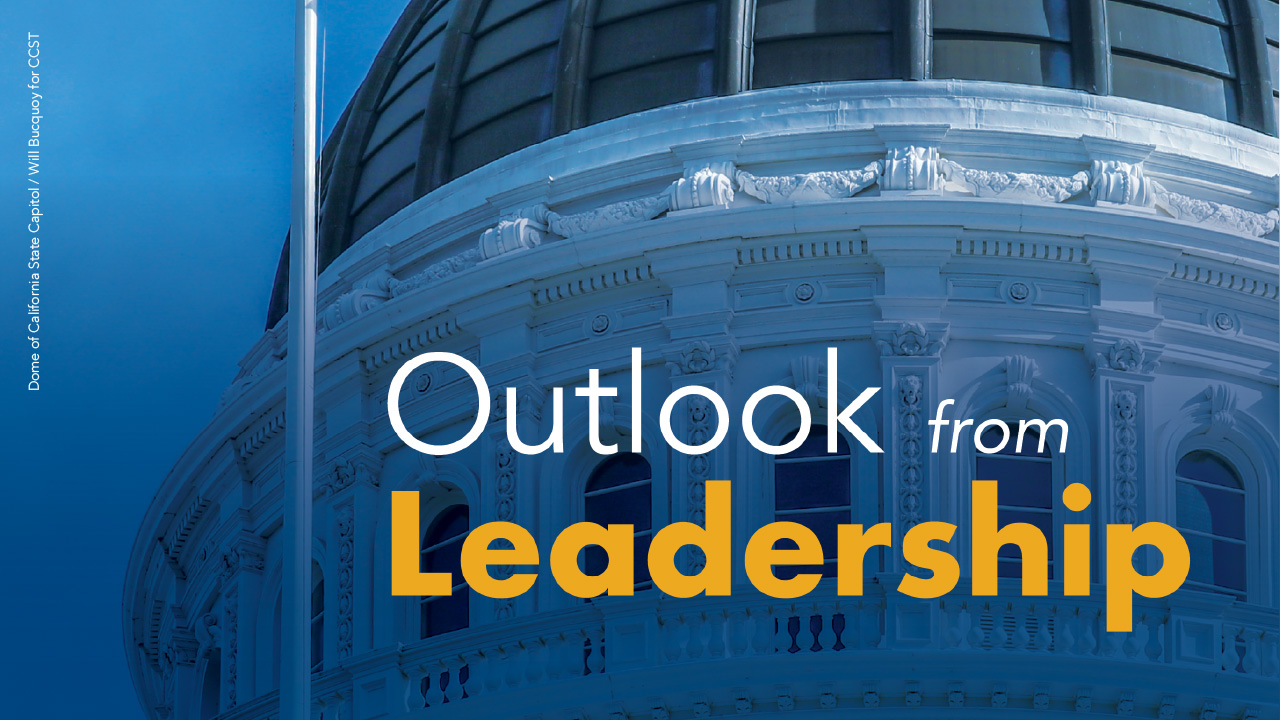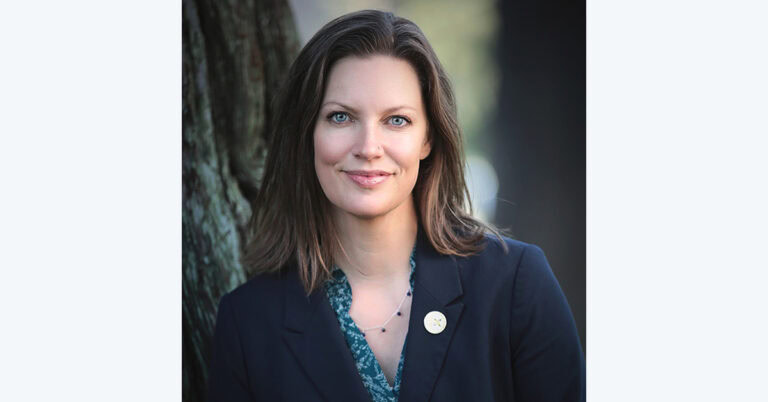Deputy Director
CCST Annual Report 2022
May 24, 2023 | CCST Newsroom, CCST S&T Policy Fellows, CCST Science & Technology Week | Contact: Mikel Shybut
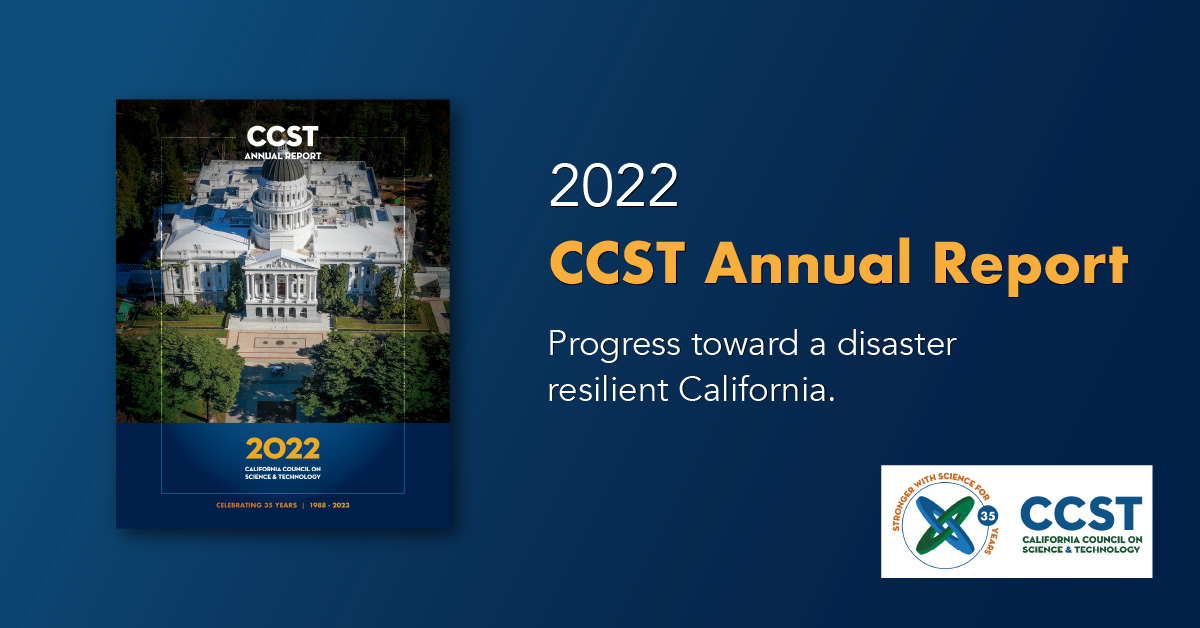
In 2021, we launched CCST’s five-year strategic plan, “Toward a Resilient California” – a call to action that outlines three clear, measurable goals to guide our work in this critical time for our state and the planet. They are ambitious targets that will amplify the Golden State’s global leadership, driving urgent change toward a more resilient and equitable future.
We had ample opportunity to put our vision into action in 2022, as we faced the growing consequences of the climate crisis, the need for a more holistic and inclusive public health system, the imperative to build California’s disaster resilience, and more. Fortunately, the values that have guided CCST for 35 years – service, independence, and partnership – helped us meet these challenges head-on.
Collaboration was especially key in 2022. By working together across our extraordinary network of partners, researchers, public servants, and philanthropists, CCST paved the way for new and creative solutions to some of our most daunting problems. We made headway on two disaster resilience efforts addressing the impacts of wildfire: our policy accelerator project with the Federation of American Scientists (FAS) to support the work of the Federal Wildland Fire Mitigation and Management Commission; and a joint project with Blue Forest linking public health to forest health via wildfire smoke, which is slated for release in late summer 2023.
Fortunately, the values that have guided CCST for 35 years – service, independence, and partnership – helped us meet these challenges head-on.
Assimilating lessons learned from the COVID-19 pandemic, CCST’s COVID-19 Steering Committee released “California Policy Actions for Pandemic Preparation, Response, and Recovery” in summer 2022. The White Paper presented 34 recommendations for policymakers to consider in efforts to improve California’s resilience to COVID-19 and prepare for future pandemics and other disasters.
Backed by California’s continued dedication to policies based on science and technology, we are grateful to have the State’s commitment of funding to the CCST S&T Policy Fellowship. This funding bolsters a program that benefits California in so many ways, creating career-boosting pathways to bring some of the nation’s top scientific thinkers to California.
As we embark on 35 years of delivering “science at your service” to California policymakers, we have big goals still ahead of us – and it’s clear that we cannot achieve these goals alone. It will take more partnerships across sectors and disciplines, as we continue to build bridges between S&T experts and policymakers, cultivating the kind of trust and collaboration that leads to informed action. And, of course, it will take our incredible community of supporters.
Thank you for being part of that community, and for your generous gifts of your time, resources and partnership as, together, we continue growing and ensuring that California leads the way toward a stronger, more resilient future.

Our Partners
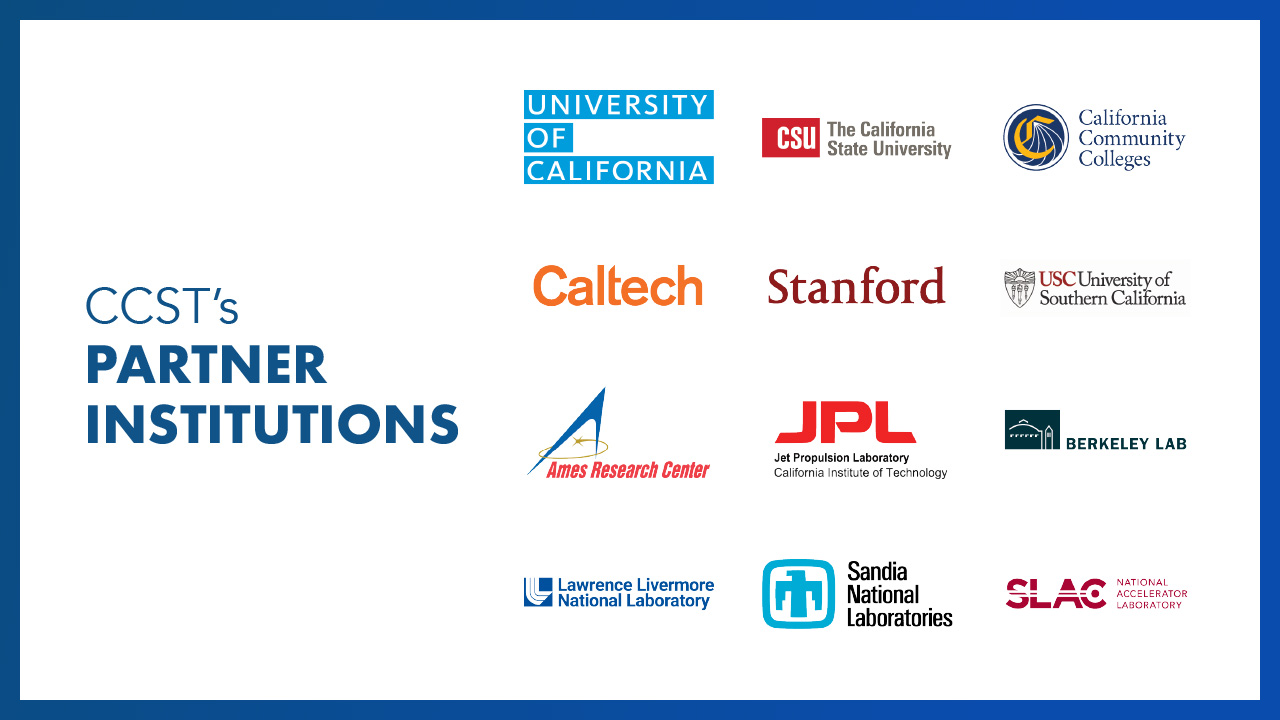
We work across institutions, partnering with academic, research, governmental, philanthropic, and other communities to leverage their collective expertise and diverse perspectives to fulfill our mission. This includes formal partnerships with California’s major post-secondary institutions and federal labs and research centers.
Science Services
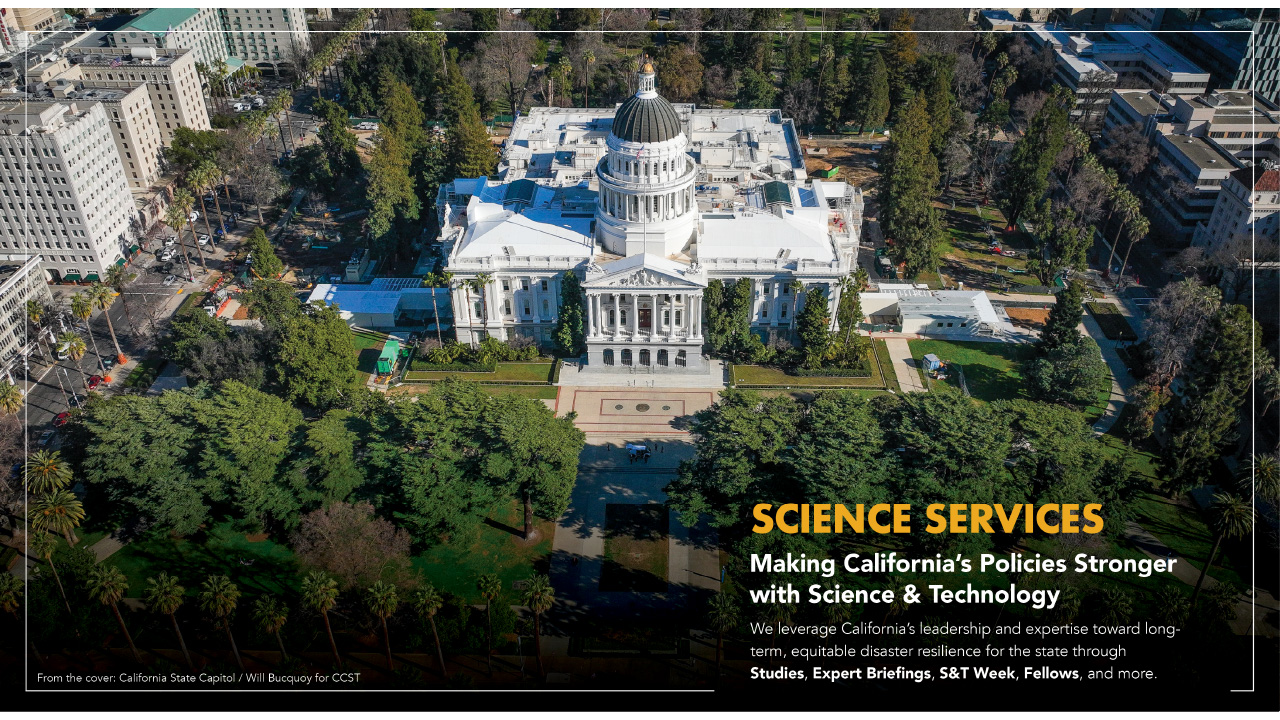
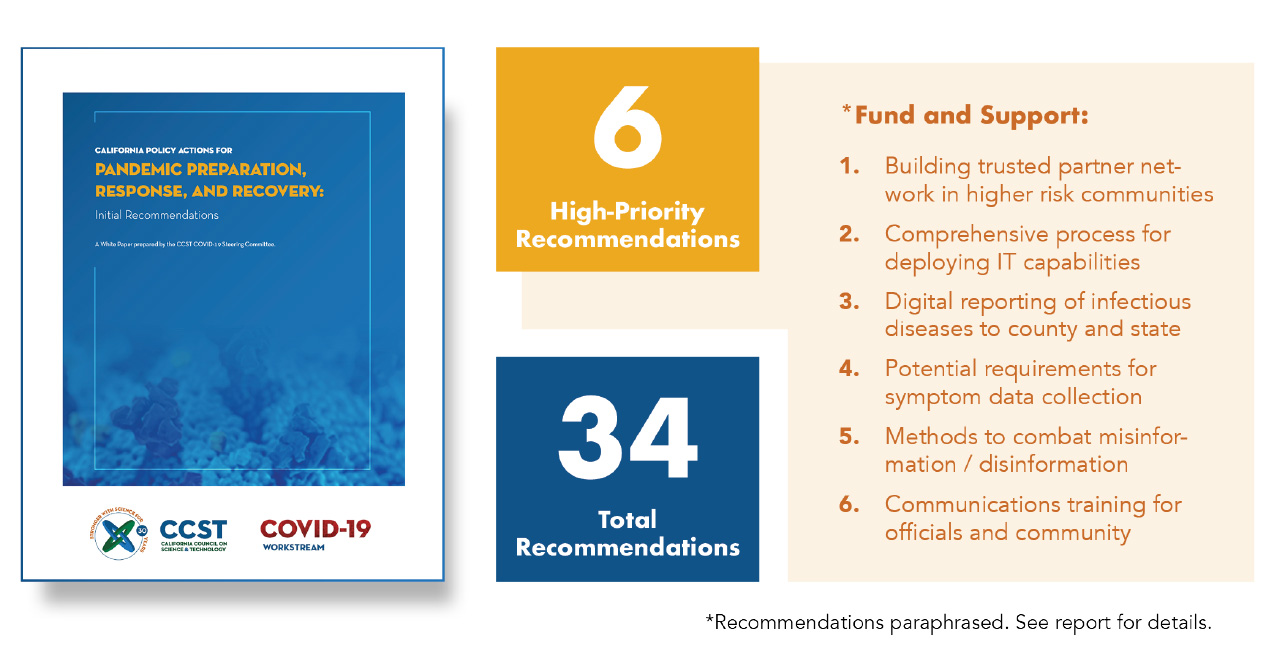
California Policy Actions for Pandemic Preparation, Response, and Recovery
CCST’s Pandemic Action Plan is part of a broad effort to bring California’s science and technology expertise to bear on some of the state’s most critical challenges—and to advise California to emerge from disasters more resilient.
CCST assembled a subset of experts to join the CCST COVID-19 Steering Committee. These six experts, spanning diverse fields including the behavioral, epidemiological, and medical sciences, help drive the direction and scope of the Pandemic Action Plan of CCST’s Disaster Resilience Initiative.
The Steering Committee, along with CCST staff, met with policymakers, researchers, and practitioners from across CCST’s expert network to understand the challenges faced in responding to the pandemic.
Drawing on their diverse expertise and experiences, the Committee developed 34 recommendations, including 6 high-priority recommendations, for policymakers to consider as a start to addressing some of these challenges. Implementing these actions would improve California’s resilience to the current pandemic and to looming future pandemics.
In 2022, the Committee held two facilitated workshops with experts, and published their proceedings:
- Reimagining a 21st Century Public Health System
- Designing Operable Privacy Standards for Data Sharing during Public Health Emergencies
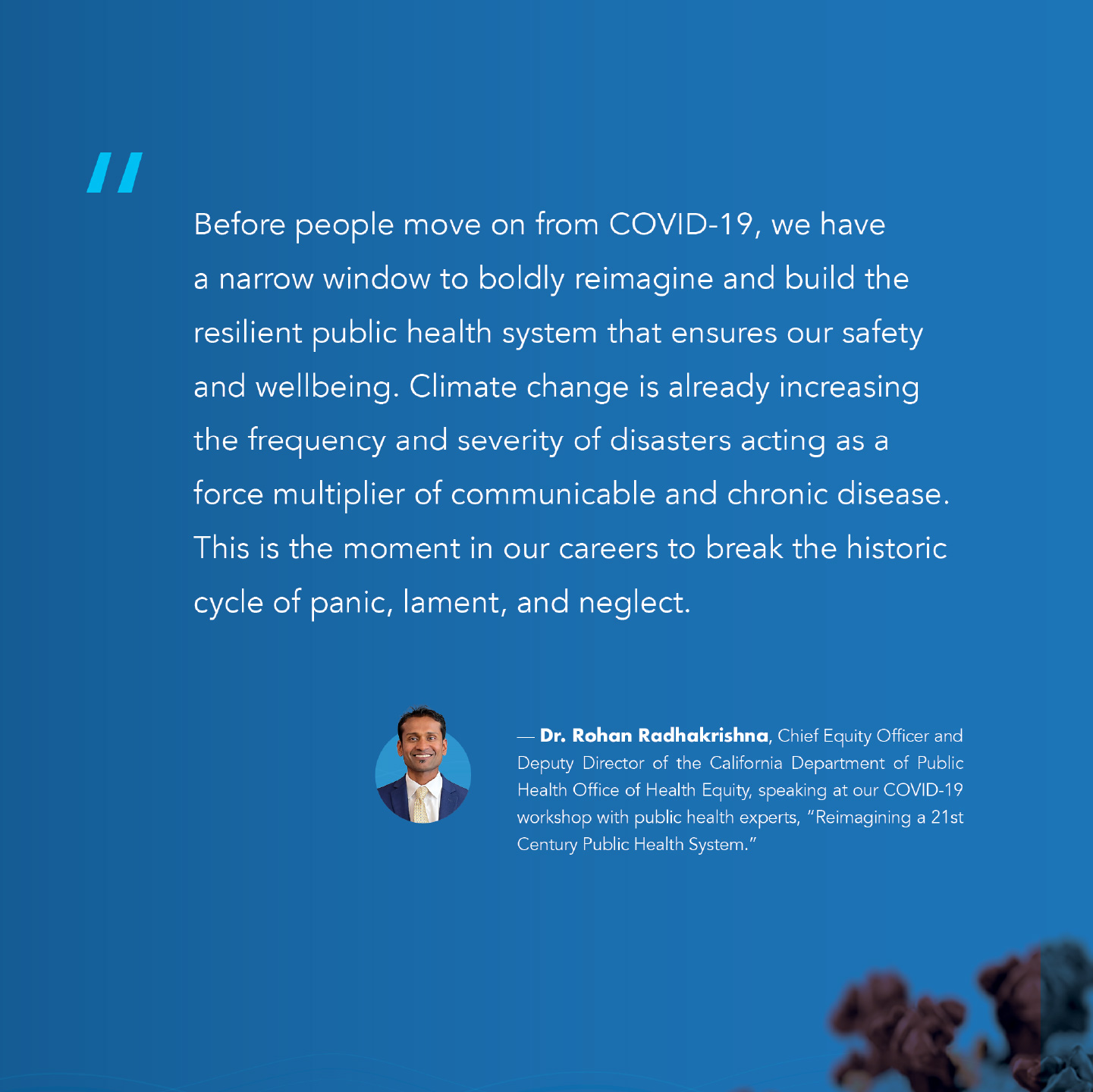
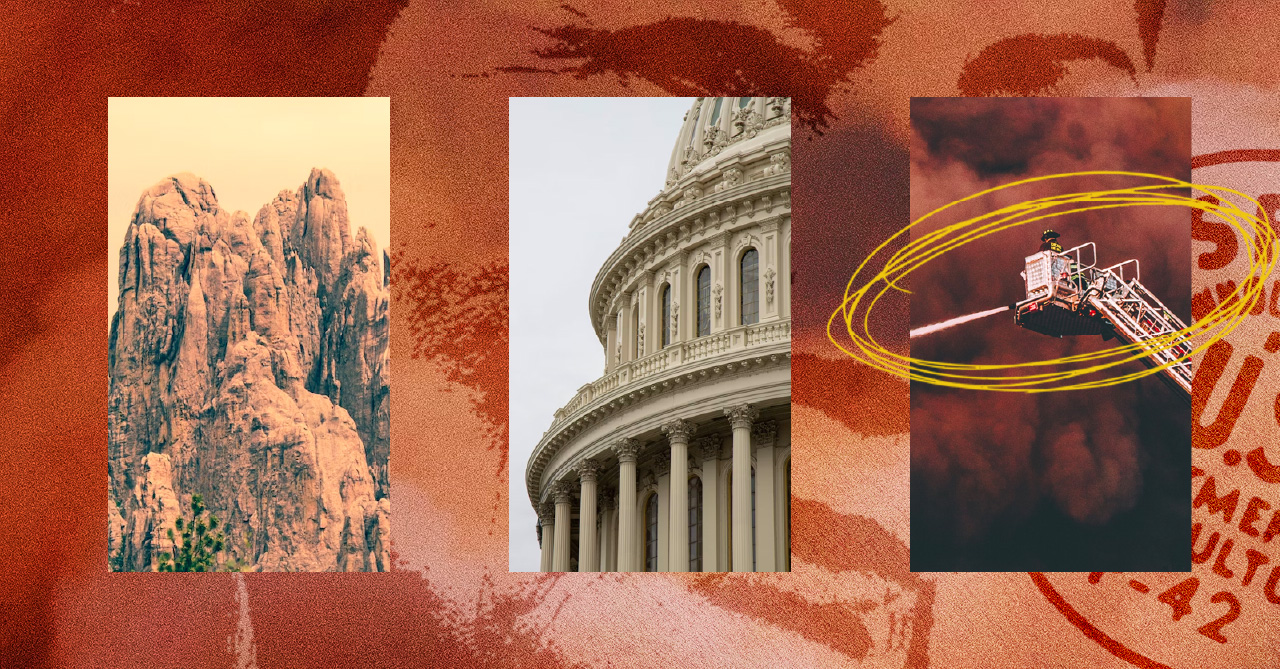
Funding Wildfire Solutions Informed by Science
In January 2022, we announced a joint project between CCST and Blue Forest Conservation on studying the connections between forest health, wildfire smoke, and public health – with funding from the National Forest Foundation, US Endowment for Forestry and Communities, and USFS’s Innovative Finance for National Forests (IFNF) grant program.
The public health impacts of wildfire smoke are a severely under-represented and under-quantified impact of recent catastrophic wildfires. This ongoing study (Summer 2023) aims to explicitly make the connection between forest management, wildfire smoke, and stakeholders that pay high healthcare costs, to identify potential motivations for investment in activities that reduce wildfire risk.
In September, 2022, CCST joined with the Federation of American Scientist’s (FAS) Day One Project, COMPASS, and Conservation X Labs in a call for experts for their Wildland Fire Policy Accelerator. This accelerator seeks to find new policy ideas informed by science, evidence, and Indigenous perspectives. FAS will provide recommendations to the Wildland Fire Mitigation and Management Commission, tasked with providing recommendations to Congress on ways to better prevent, manage, suppress and recover from wildfires.
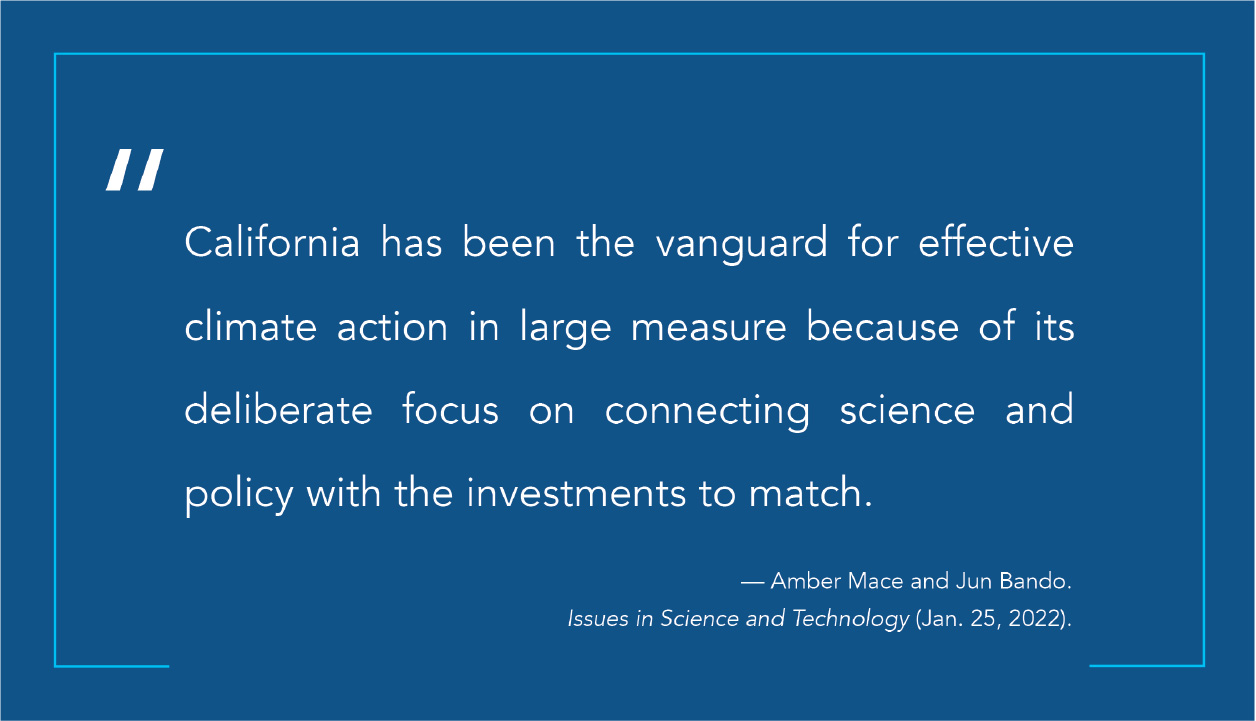
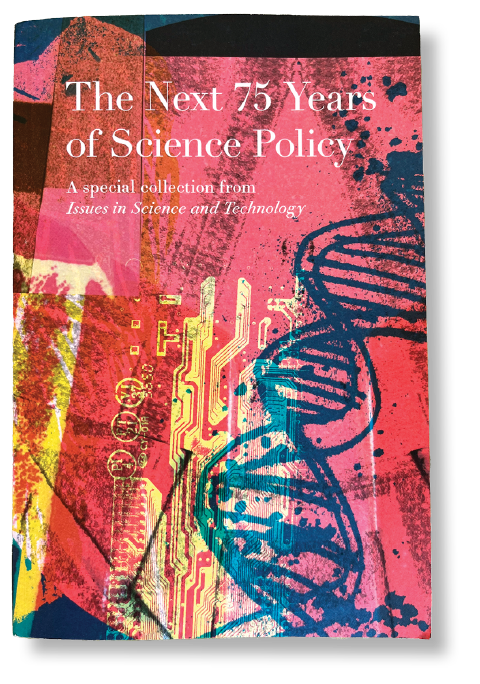
The Next 75 Years of Science Policy:
States as Laboratories for Science Policy Innovation
In January 2022, Issues in Science and Technology published “States as Laboratories for Science Policy Innovation,” by Amber Mace, CCST CEO, and Jun Bando, former Senior Advisor at CCST. The essay is part of Issues in Science and Technology’s “The Next 75 Years of Science Policy,” available online and in a book compilation.
Expert Briefings
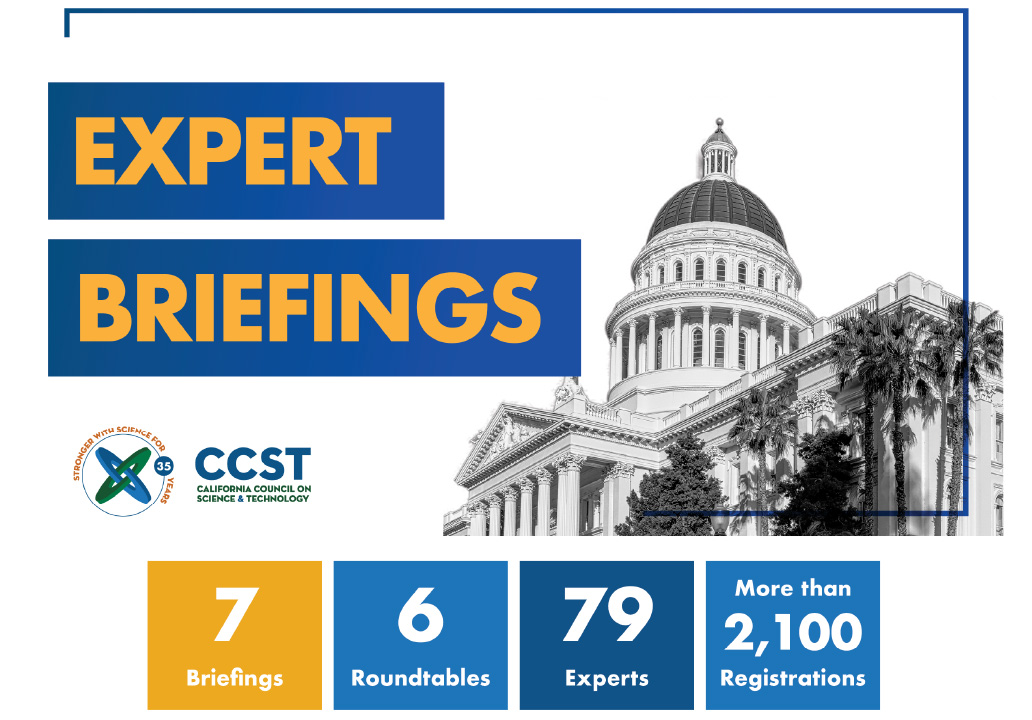
Advancing Sound Policy Solutions to California’s Major Challenges
CCST Expert Briefings, often held in partnership with State leaders of peer organizations, convene leading experts from CCST’s Partner Institutions and beyond to address pressing scientific and technical questions facing California policymakers. The one-hour briefings provide insights into long-term, equitable solutions for challenges ranging from climate change and extreme weather events to microgrids and salinity.
In 2022, CCST held a series of seven briefings, focused on identifying and addressing the key issues on the California policy landscape critical to ensuring long-term disaster resilience.
In the fall, we also partnered with the Governor’s Office of Planning and Research on a series of six public roundtables for California’s Fifth Climate Change Assessment. The series helped to identify how future research can incorporate equity, traditional knowledges, governance, economic impacts, and climate financing.
Science & Technology Week
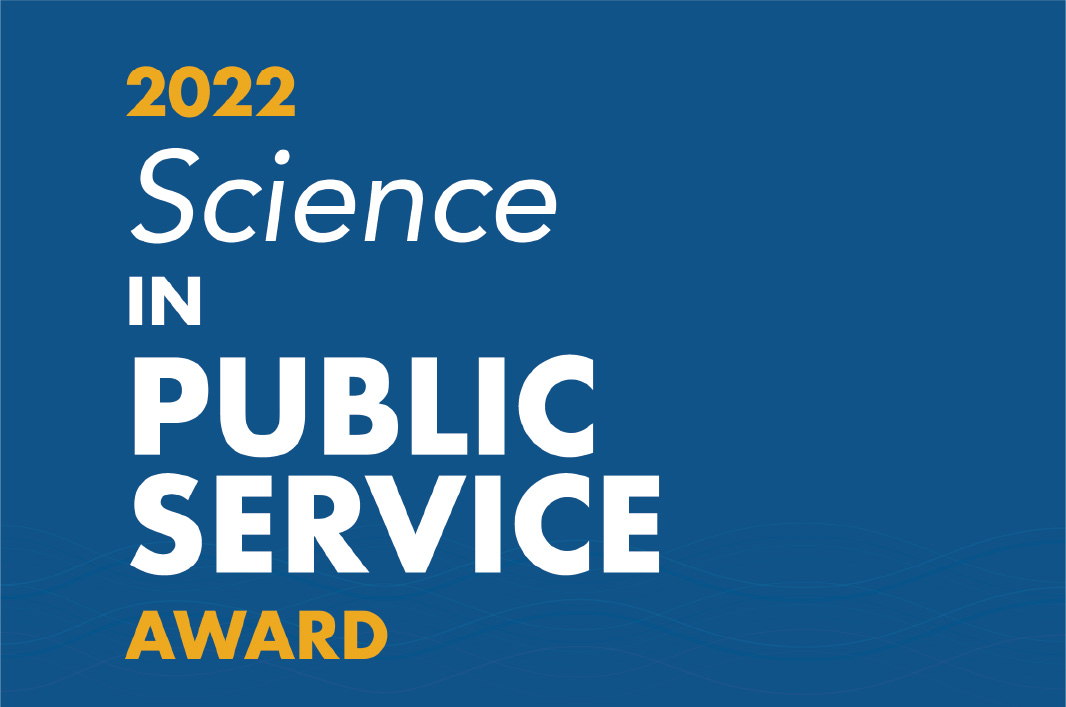
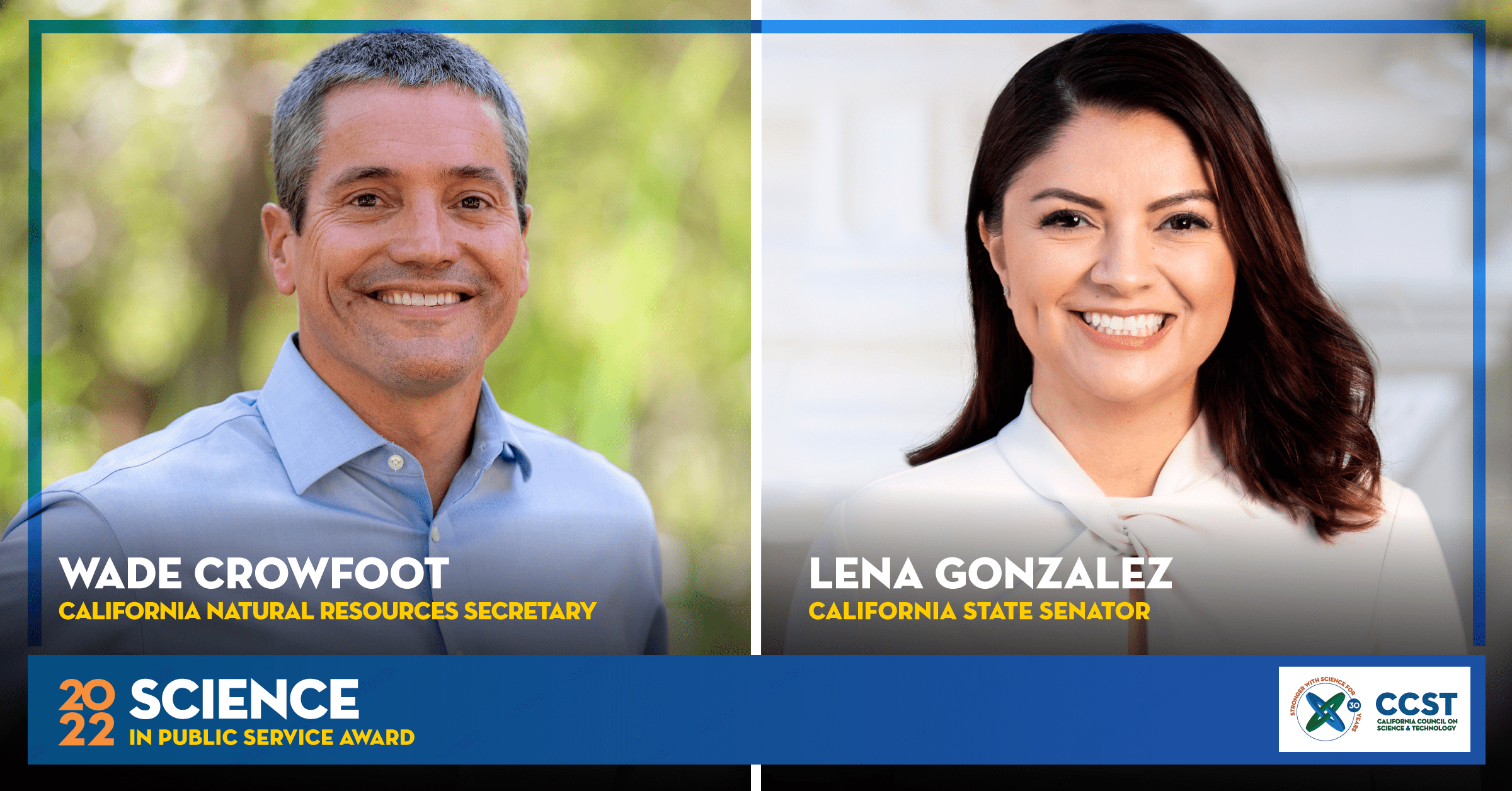
Recognizing Science in Public Service
Held as part of CCST’s annual Science & Technology Week, a celebration of “Science at Your Service,” CCST’s Leadership Awards recognize California’s champions for science and technology issues.
The CCST Science in Public Service Award is given to public servants with a clear track record of championing science and technology issues and who value efforts to connect science to policy. The 2022 awardees, California Natural Resources Secretary Wade Crowfoot and California State Senator Lena Gonzalez, were recognized for their career leadership on implementing science-informed solutions in California.
The awardees were recognized during CCST’s annual S&T Week Leadership Roundtable, bringing together leaders from our Board and Partner Institutions to connect directly with California’s thought leaders to identify issues of import for CCST and California.
—
Watch and Subscribe:
Be sure to subscribe to CCST’s YouTube channel, where you can watch Secretary Crowfoot and Senator Gonzalez receive the CCST Science in Public Service award, as well as catch all of our latest CCST Expert Briefings and other CCST events.
View the 2022 Awards (YouTube)

I’m amazed by all we were able to accomplish together in 2022 — a year of major growth for CCST, for our expanding team, and for the depth and reach of our impact.
It was a year of deeper listening and broader outreach as we strengthened relationships and built new ones within the Sacramento policy community. CCST gained a wider reputation as a dynamic and responsive resource to partners and policymakers, delivering on our organizational values of service, independence, and partnership as we stayed nimble to the changing landscape and evolving priorities.
Our passionate and hardworking team stepped up to lead our Science Services and our CCST Science and Technology Policy Fellowship, drawing upon the diverse experience of CCST’s expert network to address some of the state’s most pressing challenges, from climate change to COVID-19.
Utilizing the skills honed by our Science Services team, we partnered with the California Governor’s Office of Planning and Research to identify critical research gaps to study for California’s 5th Climate Change Assessment—bringing together experts and practitioners through a series of public roundtable discussions. Collaborations like this one can catalyze innovative and effective policy solutions to society’s most complex problems. As CCST CEO Amber Mace and former CCST Senior Advisor Jun Bando wrote in their Issues in Science and Technology article:
When crises strike, the activation of existing partnerships, together with engagement by boundary organizations, can facilitate collaboration at the speed of relevance.
CCST is proud to be a boundary organization available to help when and where we’re needed most, ensuring that science has a seat at the table during critical decision making.
Thank you for helping to make our work possible. We look forward to celebrating our 35th anniversary with you!

CCST Science & Technology
Policy Fellowship
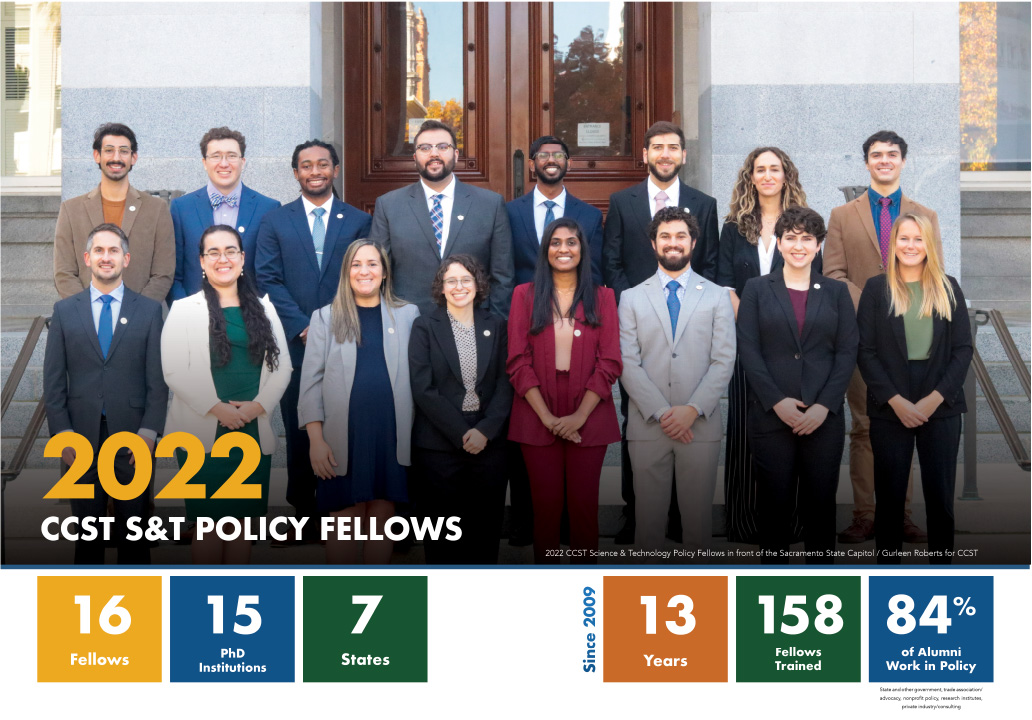
Providing scientists with a year of government service and leadership training for a science policy career.
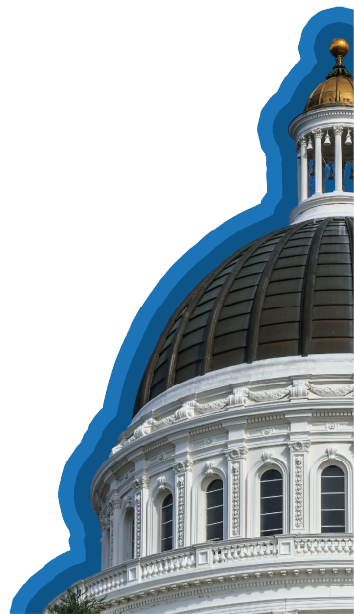
The 2022 class of Fellows marked our 13th year of placing PhD-level scientists, engineers, and social scientists directly into legislative offices, policy committees, and more recently State Agencies and Offices of the Governor. The 2022 class of 16 Fellows applied their diverse technical research backgrounds in the biological sciences, materials science, sociology, developmental psychology, and oceanography, to name a few, to their work with the State of California’s leading and priority-setting policy institutions.
Working in placements that included the California Governor’s Office of Emergency Services, California Natural Resources Agency, Assembly Utilities and Energy Committee, Assembly Judiciary Committee, Senate Environmental Quality Committee, California Air Resources Board, and more, CCST S&T Policy Fellows made an impact across a range of policy and regulatory fields.
This year, the 2022 class began their Fellowship training at CCST’s Sacramento headquarters, returning in person after last year’s virtual training program. For many of them, this was their first time living in California. During their training, the Fellows dove into California’s rich political history and learned how California’s policymaking process works, from idea to implementation.
Altogether, CCST S&T Policy Fellows have worked on over 1,300 bills, briefings, hearings, and bill analyses. There are now 144 alumni of the program, many of whom serve in positions in legislative offices and agencies.
With the arrival of the 2023 class in November, 158 Fellows have now been trained to work directly with policymakers as trusted staff. Further, 96% of fellows recently surveyed were likely to recommend CCST to other scientists and engineers.
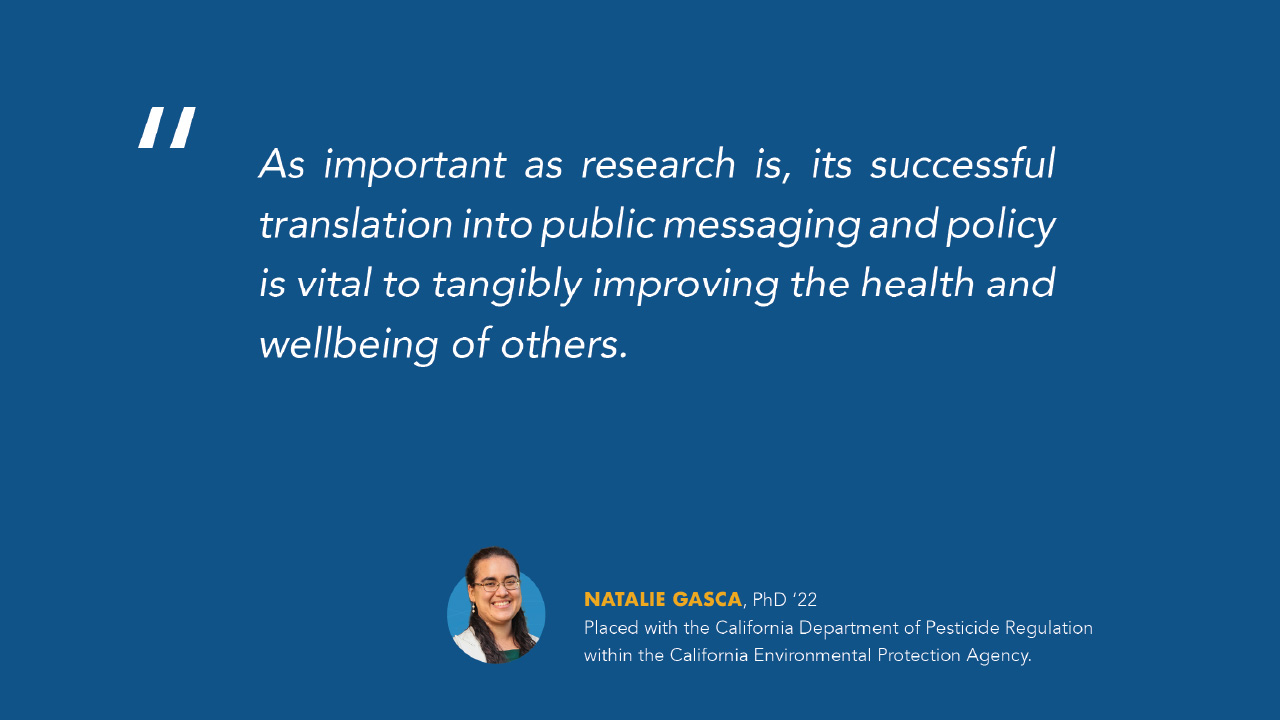
Meet Our Board

Learn more about our CCST Board of Directors.
Audited Financials (2022)
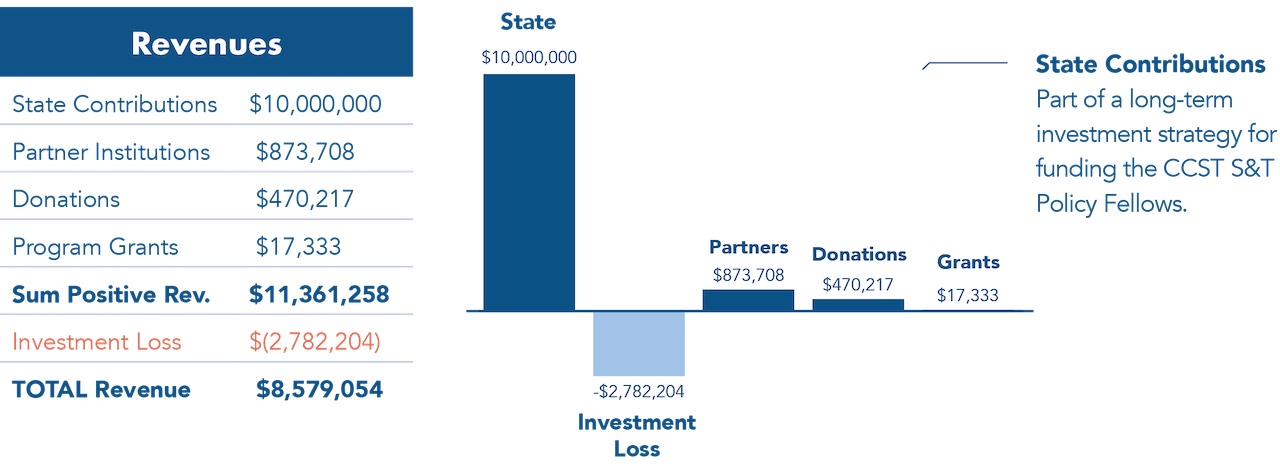
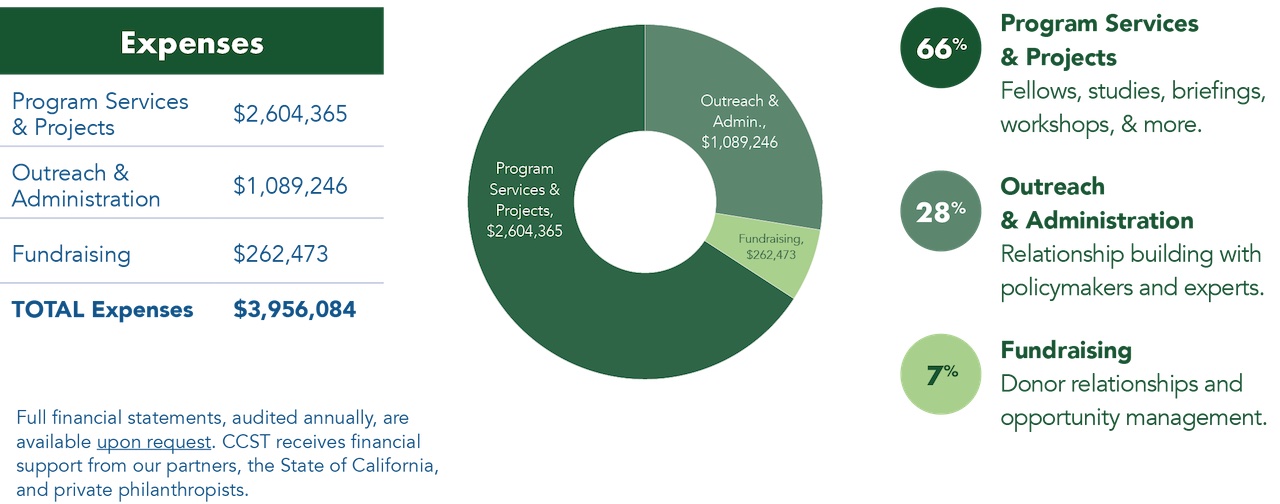

Thank you!
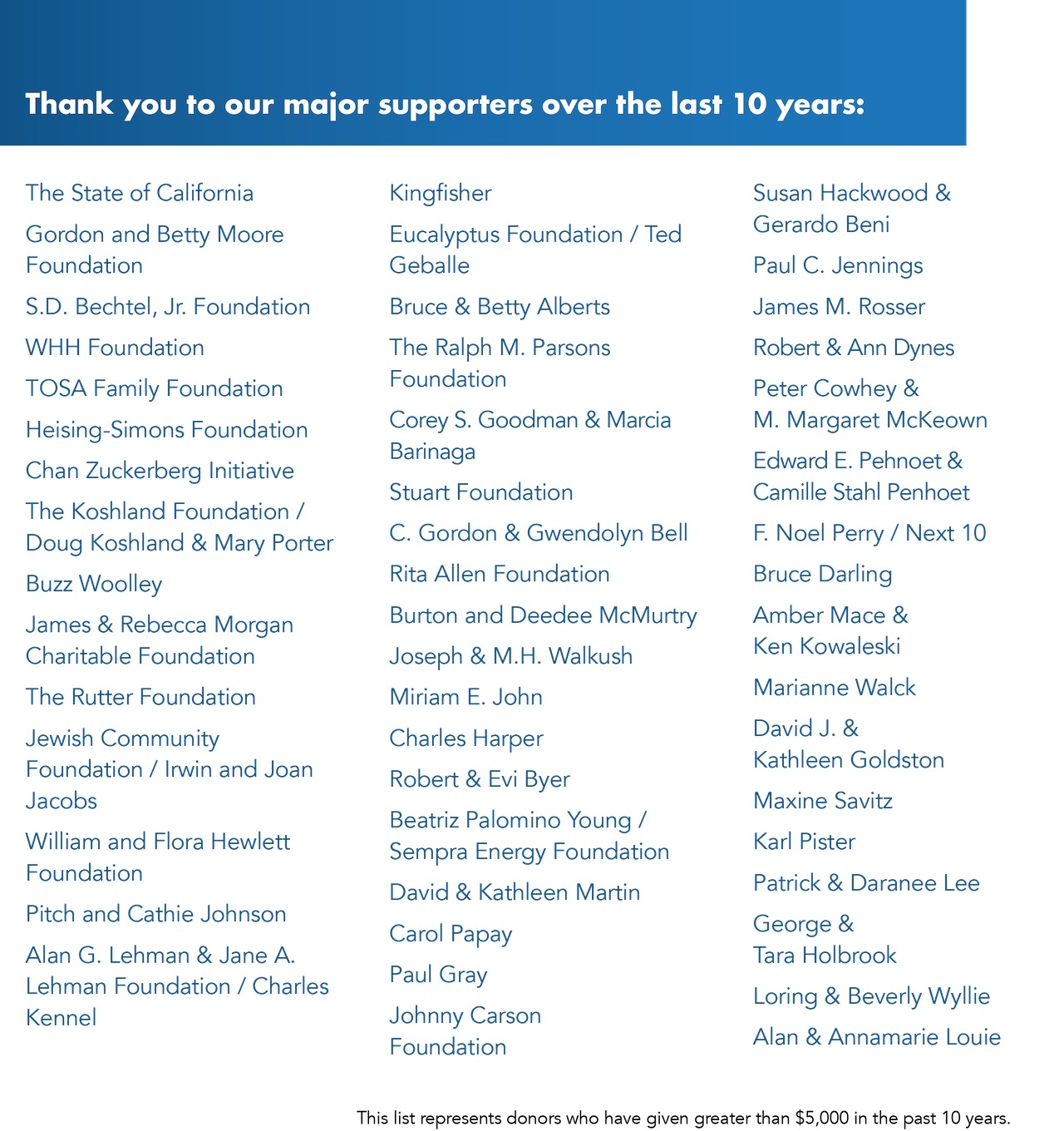
Read the full report:
Download a PDF of the full report to read all about our progress toward a disaster resilient California.
###
About the California Council on Science and Technology
The California Council on Science and Technology is a nonpartisan, nonprofit organization established via the California State Legislature — making California’s policies stronger with science since 1988. We engage leading experts in science and technology to advise State policymakers — ensuring that California policy is strengthened and informed by scientific knowledge, research, and innovation.

